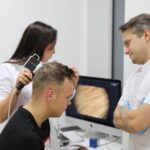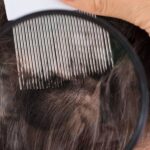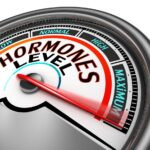Eating disorders such as anorexia, bulimia, and orthorexia are mental health conditions that deeply and often destructively affect the entire body – including the skin, nails, and hair. For many people struggling with these problems, hair loss becomes one of the first visible symptoms and a major source of stress and lowered self-esteem. While the causes of eating disorders are complex and require specialist psychological support, their physical consequences – including alopecia – can often be alleviated or even stopped with proper diagnosis and medical care.
Why does hair fall out in anorexia, bulimia, or orthorexia?
The body of a person with an eating disorder quickly switches into energy-saving mode. If calorie intake is too low, the body reduces functions that are not essential for survival. Hair stops growing, and many strands shift from the anagen (growth) phase into telogen (rest), leading to excessive shedding – known as telogen effluvium. In severe cases, this results in significant thinning across the entire scalp, as well as weakened eyebrows and eyelashes.
“Hair is one of the first indicators that the body is failing to cope. Excessive shedding often tells us more than many lab tests – it’s a silent alarm signal that must not be ignored.”
— Dr Piotr Turkowski, plastic surgeon and trichology specialist
Additionally, deficiencies of iron, zinc, biotin, vitamin B12, and protein directly affect hair structure. Hair becomes thin, brittle, dull, and splits easily, often falling out in handfuls. In bulimia, frequent vomiting leads to electrolyte imbalances, potassium deficiency, and dehydration, which also harm the scalp and follicles. Orthorexia – obsessive control over the “purity” of food – often results in eliminating entire food groups, which, although seemingly healthy, actually leads to deep nutritional deficiencies.
Hormones, stress, and the hair cycle – what happens inside the body?
Eating disorders also disrupt hormonal balance, which directly influences hair shedding. In women, menstruation often stops due to reduced estrogen levels and disruption of the hypothalamic-pituitary-ovarian axis. Estrogens normally protect hair follicles, and their deficiency accelerates shedding and slows regrowth. Cortisol levels also rise – the stress hormone, which has pro-inflammatory effects and further reduces scalp blood flow.
Read more: The impact of hormones on hair loss – which hormones should you test?
Changes in thyroid hormones – low calorie and nutrient intake can lower T3 levels, leading not only to fatigue, feeling cold, and dry skin, but also increased hair loss. In chronic stress and energy deficiency, the body focuses solely on survival, and hair follicles are “shut down.”
The result is a general weakening of the hair cycle, with reduced growth quality – hair grows more slowly, thinner, and fewer follicles enter the growth phase. For patients, this means not just reduced volume but also prolonged recovery even after health stabilizes.
Can hair loss be reversed? Chances of regrowth
The most common question patients with eating disorder-related hair loss ask is: will my hair grow back? The answer is – yes, but under certain conditions. The essential condition is restoring proper nutritional status, which requires long-term cooperation with a clinical dietitian, psychotherapist, and physician. While the process is difficult and time-consuming, returning to a healthy BMI and balanced diet gives follicles a chance to recover.
Hair has a high regenerative capacity if provided with the right conditions: protein, iron, zinc, B vitamins, healthy hormone levels, and adequate scalp blood flow. In our clinic, we have observed cases where, after a few months of nutritional recovery, hair begins to regrow, becoming stronger and more resilient. The key is consistency and an individualized therapeutic strategy.
Medical and trichological support – how we can help at Piotr Turkowski’s Clinic
At Piotr Turkowski’s Clinic, we understand that hair loss can have very complex causes, and eating disorders belong to the most challenging diagnostic cases. That’s why every person coming to us with hair loss is provided with comprehensive care. We perform a thorough medical interview, laboratory tests (including ferritin, thyroid hormones, vitamins, and minerals), and scalp and follicle analysis.
When malnutrition is the cause, we recommend close cooperation with nutrition and psychotherapy specialists, while introducing gentle, supportive local therapies. These may include mesotherapy with amino acid- and vitamin-rich solutions, platelet-rich plasma (PRP), and microcirculation-boosting treatments to improve scalp oxygenation and speed follicle recovery.
It is important to stress that there is no one-size-fits-all solution. Treatment requires understanding the specific cause of hair loss, patience, and gradually rebuilding the body’s health from within. Aesthetic medicine and trichology treatments play a supportive role, but they can never replace restoring psychophysical stability.
Hair loss as an alarm signal – don’t ignore the symptom
Hair loss in the context of eating disorders is not just an aesthetic issue but a real signal that the body is in crisis. For many, this symptom becomes a turning point that motivates them to seek help. And rightly so – because while hair is not a vital organ, it reflects overall health. Healthy, strong, and dense hair is the result of balanced living, proper nutrition, inner peace, and self-care.
At our clinic, we treat each case individually. We understand that weakened hair may be linked to a long emotional and medical history. Our goal is not only to improve appearance but also to support patients in regaining health and comfort. If you notice excessive hair shedding and suspect it may be linked to diet or an eating disorder – don’t wait. Contact us, and together we will find the best solution.






